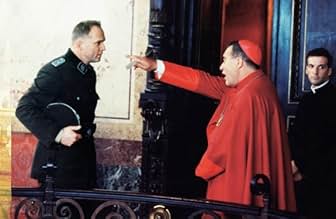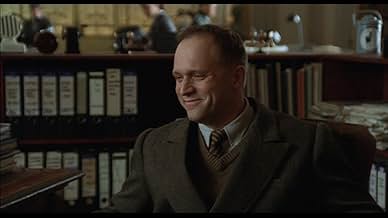Adicionar um enredo no seu idiomaDuring WWII SS officer Kurt Gerstein tries to inform Pope Pius XII about Jews being sent to extermination camps. Young Jesuit priest Riccardo Fontana helps him in the difficult mission to in... Ler tudoDuring WWII SS officer Kurt Gerstein tries to inform Pope Pius XII about Jews being sent to extermination camps. Young Jesuit priest Riccardo Fontana helps him in the difficult mission to inform the world.During WWII SS officer Kurt Gerstein tries to inform Pope Pius XII about Jews being sent to extermination camps. Young Jesuit priest Riccardo Fontana helps him in the difficult mission to inform the world.
- Direção
- Roteiristas
- Artistas
- Prêmios
- 4 vitórias e 9 indicações no total
- Direção
- Roteiristas
- Elenco e equipe completos
- Produção, bilheteria e muito mais no IMDbPro
Avaliações em destaque
Another perfect performance is given by the priest who tries to help the German officer. Mathieu Kassovitz (who also played the male leading role in 'Le Fabuleux destin d'Amélie Poulain')is very convincing in his role.
I think this movie is highly underrated. Costa-Gavras has made an important movie with 'Amen.' which looks at the holocaust-tragedy from another point of view which is seldom showed. The movie gives a true although unbelievable answer at one of the most important questions concerning the holocaust: didn't anyone saw this coming? Couldn't anyone prevent this from happening?
If you really want to know the answers to this questions, you certainly have to watch 'Amen.'. This movie should at least have an 8 and I'll give you two reasons why: one because the story is unique and magnificently told; and two because the two leading actors are giving the performance of a lifetime. Highly recommendable!
9/10
"Amen" begins with the Nazi euthanasia program aimed at murdering retarded and mentally ill Germans. A campaign, spearheaded by both Protestant and Catholic clerics and their flocks, forced the regime to end the killings. Some have argued that this sole widespread public rejection of Nazi homicidal machinations might well have been repeated if Germans were alerted - internally or through specific denunciations by the pope and foreign leaders - of the fate of deported Jews and those rounded up in conquered territories. "Amen's" Kurt Gerstein and his priest friend both believe that would have happened.
That argument is at best questionable and, more likely, reflects the human need for the wish to spawn the thought. Whether one accepts the Goldenhagen thesis of mass complicity by Germans in the Holocaust, the fact remains that when the slaughter began Germany was at war and, as a character in "Amen" notes, defending the Reich and winning the war, to say nothing of staying clear of what would be seen as treasonous ideas, was the only realistic option.
Kurt Gerstein is a mystery. As Hannah Arendt wrote of Eichmann as an example of evil's often banal incarnation, historian Saul Friedlander described Gerstein years ago in terms of the ambiguity of good. Gerstein sincerely and at risk to his life tried to warn the Vatican of the Nazi death camps. But he also worked efficiently to make those camps operationally efficient. "Amen's" Gerstein is tortured but also highly compartmentalized. He gives quick and accurate advice to improve destruction of the "units," as the Jews were referred to, and then tries to prevent use of the Zyklon B gas he helped develop with almost unbelievable declarations that shipments are defective and must be buried.
This film owes its origin not so much to Friedlander's compelling account but to Rolf Hochhuth's controversial (still so after many years) "The Deputy," presented as a play to the outrage of many. Hochhuth portrayed Pope Pius XII as insensitive and unwilling to use his moral authority to challenge an extermination program he knew to be in progress.
In the film Gerstein is aided by a young Jesuit priest whose remarkable moral and physical courage was demonstrated by a few, or perhaps too few, clerics who knew what was happening. The pope is shown as a remote, unemotional figure. The now standard explanations for the Vatican's unwillingness to take on the Nazis are included in catalogue format. Allied unwillingness to bomb the death camps or take in refugee Jews are recited almost for the record. Complex questions still debated are reduced to the equivalent of sound bites. They need no repeating here.
Hochhuth's thesis which outraged many decades ago and which still brings angry denunciations has been partially rehabilitated by scholarly works such as John Cornwell's provocatively titled study, "Hitler's Pope," an exaggeration which belies the serious research and analysis within the book's covers.
Cornwell's pope is personally unpleasant, haughtily autocratic, rabidly fearful of Communism, at least mildly anti-Semitic and certainly emotionally and politically pro-German if not pro-Hitler (he wasn't that). The Pope Pius of "Amen" lacks the depth a more accurate and compelling portrayal would have provided.
The strongest moments in the film are those briefly showing the efficiency of the death camps focusing less on the victims, most of whom aren't shown, but rather on the chillingly competent technicians and logisticians without whose efforts millions could not have been murdered.
Director Costa-Gravas deserves much credit for bringing a difficult to tell complex story to the screen. Ultimately, however, we know less about Kurt Gerstein than we need to and the Vatican, from pope to bureaucrat, is too colorless. Was Gerstein a victim or a collaborator with a schizophrenic sense of morality? Even scholar Friedlander couldn't answer that question. Did the Vicar of Christ shame his church's vision of Jesus by putting political expediency ahead of moral imperative? That is a very alive issue today but "Amen" gives us a largely one-dimensional Supreme Pontiff.
The cast is unknown to American viewers but all act with varying but generally strong ability. Gerstein and the Jesuit priest are especially well portrayed as men of deep conviction.
7/10
This is an excellent film, and exemplifies, I think, the role of the arts in raising society's level of conscience and effecting social change. It galls me that a mind set is growing, (sixty years later) that refutes the occurrence of the holocaust. All the pictures, names and movie footage in the world will never change these people's minds; convincing them is not the issue. But when you take on the large institutions of society, when you make them accountable and demand that they fess up to their inadequacies, and that they not allow it to happen again, then you get the kind of permanent, positive change that is not eroded by a capricious shift in the political winds.
The amazing thing about this film was the powerful effect it achieved with very little, if any, shocking footage. We are conditioned to look away from all the "standard" holocaust images - the drawn faces, the gaunt skeletons, the bones in the ovens, the piles of shoes and personal effects. Instead, Gavras uses Gerstein's involvement with the engineering side of the issue, and paints a chilling picture of the magnitude of the killings. The project management meetings where they discuss the efficiency improvement strategies for gassing people and cleaning out the chambers are eerily similar to meetings I and many other Dilbert-types attend on a regular basis. The final scene at the camp where all the SS facilities officers chorus their concerns over decreased KILLING efficiency is ridiculously chilling. These guys could be whining about their bottom line numbers at a board meeting for any major corporation.
Gavras hammers home the numbers with the repeated scenes of empty trains going and full trains coming - and you never see a person in the full ones, only closed doors. Think about the numbers. A million people a year is nearly three thousand a day. Instead of making his point with stark images, the way so many other films have, Gavras keeps hammering the shear logistics, the size of the camps, the amounts of the gas needed, the HUGE numbers of people that had to be transported. Think of how big a train with a thousand people is - that's over three times the capacity of the biggest airliners. Gerstein's confrontation with his old friend, the transportation officer, points out how people could vilify certain nazis (SS and Gestapo), and yet remain conveniently ignorant of their own complicity.
The Vatican issued a watered down apology in 1998, admitting partial culpability and asking forgiveness. There are still many who believe that the diplomatic tightrope the Vatican walked was the best course. The conversation between Cardinal Maglione and the German ambassador is accurately taken directly from the Vatican archives. But Gavras makes a valid case that the arguments against outing the German killing machine were weak. That other protests had yielded positive results (look up the 1943 Rosenstrasse uprising) and that the motivations for not acting more decisively were based in part on anti-Semitism, along with diplomatic prudence.
Gavras trys to show that many people who could have acted knew all the facts and chose not to act. I remember, around the time Gavras' released "Z", how the protesters at the 1968 democratic national convention chanted "THE WHOLE WORLD IS WATCHING. THE WHOLE WORLD IS WATCHING!" It didn't matter then, and Gavras makes the case that it didn't matter during the holocaust; the political powers of the world move at their own pace.
Now, sixty years later, we have the last of the actual participants dying off. WWII veterans here in the USA are dying at a rate of 1500 a day, and their ranks are dwindling. There are fewer and fewer left to tell the story or be held accountable. It is incumbent on us, however, to uncover the cover-ups, identify the systems or methods that allowed such atrocities to happen, and make the changes in our society's structure to ensure they don't happen again. Gavras' film effectively does this. Like the principals in the film, we now know the real story. Like the principals in the film, how we act with this knowledge will be judged by future generations.
The one dimensional nature of the main characters works very well - we see but a snapshot of the complexity of human nature and this begs you to ask the question of what would you do if you found yourself placed in such circumstances.
This is perhaps a trademark of Costa-Gavras's work (Mad City, Missing and Z in particular)
It is not just a cold view of the history of the time nor is it seeking to provide an answer to the big question - just shed light on the circumstances and on human nature.
Você sabia?
- CuriosidadesStefan Lux was a Jewish Czech journalist, who committed suicide in the general assembly room of the League of Nations during its session on July 3, 1936, to alert the world on the perils of German anti-Semitism. After shouting "C'est le dernier coup" ("This is the final blow") he shot himself with a revolver.
- Erros de gravaçãoIn one of the scenes they say that the Treblinka camp is out of gas, referring to Zyklon B. Treblinka didn't use Zyklon B, instead they used carbon monoxide.
- Citações
[first lines]
Stephan Lux: [interrupting a session of the Assembly of the League of Nations, Geneve, 1936] My name is Stephan Lux. I am Jewish. The Jews are being persecuted in Germany and the world doesn't care.
[He draws a pistol]
Stephan Lux: I see no other way to reach people's hearts.
[He shoots himself]
- ConexõesReferenced in Kaamelott: Amen (2005)
- Trilhas sonorasThe Train I /II
Composed and arranged by Armand Amar
Orchestra:
Jean-Philippe Audin, Elsa Benabdallah, Igor Boranian, Fabien Boudot, Florent Bremond, Karen Brunon, Nathalie Carlucci, Hervé Cavellier, Emmanuel Gaugué, Thierry Köhl, Julien Leenhardt, Bobin Minalli Bella, Marthe Moinet, Yves Monciero, Philippe Morel, Amèlie Paradis, Emmanuel Raynaud, Alexandre Sauvaire
(P) & © 2002 Long Distance/France
Principais escolhas
- How long is Amen.?Fornecido pela Alexa
Detalhes
- Data de lançamento
- Países de origem
- Centrais de atendimento oficiais
- Idiomas
- Também conhecido como
- Amen.
- Locações de filme
- Empresas de produção
- Consulte mais créditos da empresa na IMDbPro
Bilheteria
- Orçamento
- FRF 103.000.000 (estimativa)
- Faturamento bruto nos EUA e Canadá
- US$ 274.299
- Fim de semana de estreia nos EUA e Canadá
- US$ 16.284
- 26 de jan. de 2003
- Faturamento bruto mundial
- US$ 8.419.052
- Tempo de duração2 horas 12 minutos
- Cor
- Mixagem de som
- Proporção
- 1.85 : 1
Contribua para esta página


































